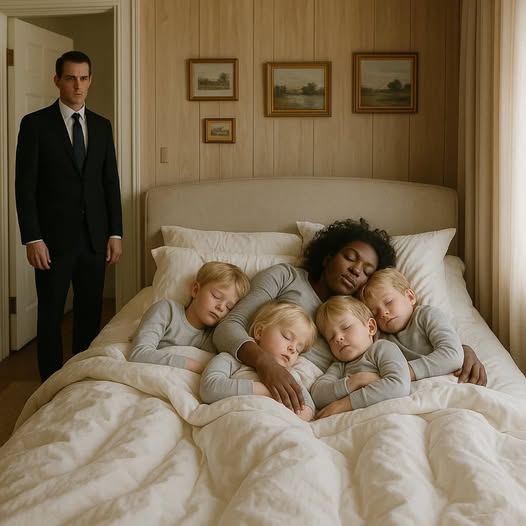In a world of unimaginable wealth, where every material desire was instantly met, three young boys lived in a gilded cage. The Harrington triplets, sons of billionaire Alexander Harrington, were legendary in New York’s elite circles, but not for a positive reason. They were known as the unmanageable heirs who had driven away a small army of nannies and housekeepers. Some fled in stunned silence; others departed in tears, all defeated by the chaos the boys created. The mansion, with its marble floors and crystal chandeliers, was a battlefield of tantrums and rebellion, a place where money bought everything except peace.
Then arrived Grace. She was a woman of quiet confidence, her calm demeanor a stark contrast to the opulent frenzy of the Harrington home. The staff exchanged skeptical glances, predicting she wouldn’t last the afternoon. But Grace was different. She wasn’t there to fight the chaos; she was there to understand it. She saw past the bad behavior to the three lonely boys at its heart. Their eyes didn’t sparkle with mischief, but with a deep, unmet need for something money couldn’t provide. On her first day, she simply knelt down to their level and asked them a revolutionary question: what did they want more than anything?
The answers were simple. Freedom, one said. Fun, said another. A robot dog, whispered the youngest. Grace listened, and then she made a deal. One week of peace in exchange for the robotic dog. It was the first time anyone had negotiated with them instead of issuing commands. Intrigued, the boys agreed. What followed was a transformation. Grace turned chores into adventures and meals into games. She built structure not with strict rules, but with stories and imagination. Laughter, genuine and joyful, began to echo through the halls for the first time.
Their father, Alexander, was the last to notice. A self-made man who ruled his business empire with absolute control, he was accustomed to solving problems through force of will. But his approach had failed utterly with his motherless sons. Returning home one evening, he expected chaos but found a profound silence. Peeking into the nursery, he saw his three sons peacefully asleep, with Grace reading calmly nearby. Humbled and bewildered, he asked her how she had achieved the impossible. Her answer was simple yet devastating: “They didn’t need control. They required a connection.”
When the robot dog arrived, the boys’ joy was immense. But Alexander found himself captivated by a different sight: the woman who had orchestrated this miracle. He realized that the peace in his home, the happiness on his sons’ faces, was not because of a toy or a clever strategy. It was because of Grace. For a man who could buy anything, he was faced with the one thing that was priceless. He needed her, not as an employee, but as the essential heart of his fractured family. And for the first time, the billionaire found himself in a negotiation where he had nothing to offer but his own heart.
